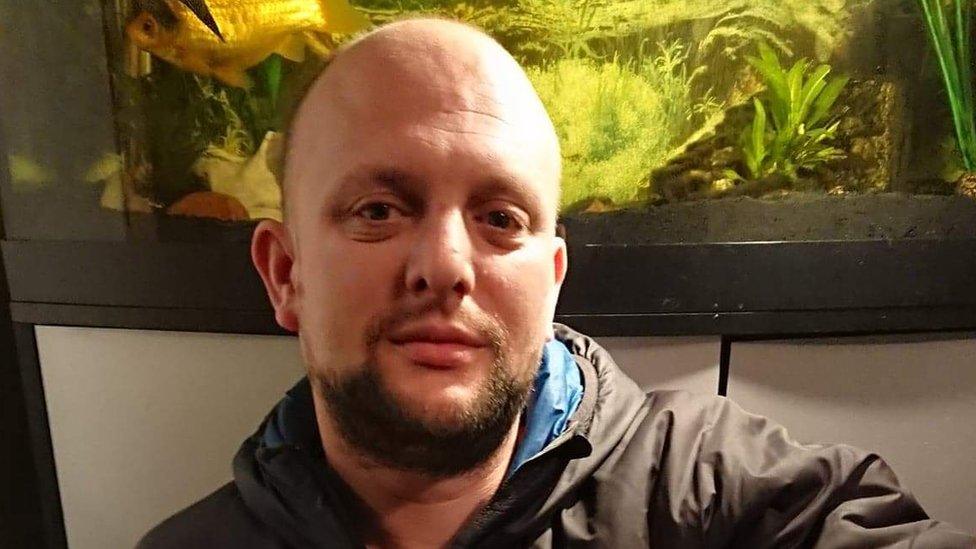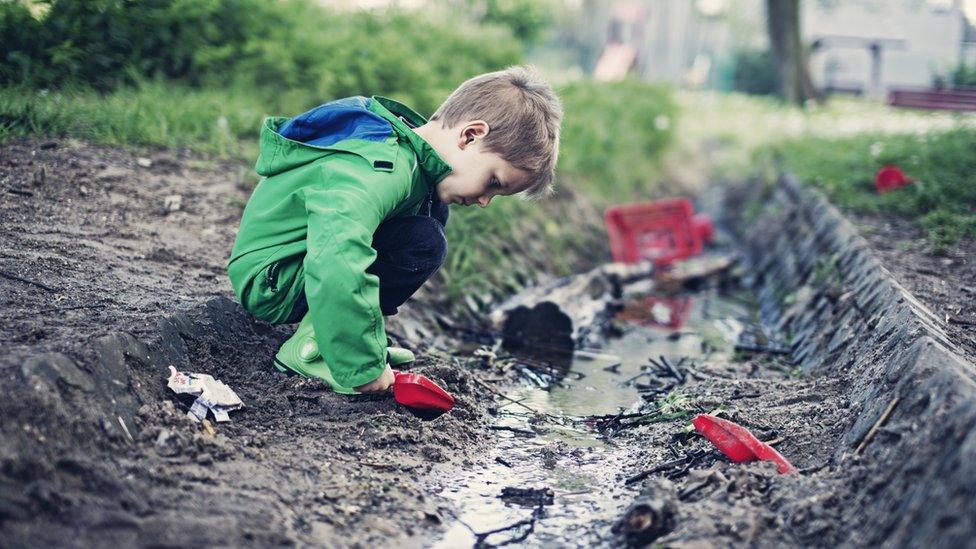Two child limit: 'My mum had to give us money for petrol'
- Published

Andrew says his credit card is "maxed out"
The policy of limiting welfare benefits to two children is having a devastating effect on families, campaigners warn.
The government says the measure will eventually save taxpayers £3bn a year.
But a report by the Church of England and the Child Poverty Action Group says the policy is "unjust" as it fails to support families through tough times.
It says 600,000 children are affected so far and predicts 1.8 million will live in affected families by 2023-24, "pushing more into poverty".
"I'm 40 and I'm having to ask my mum for money," says mother-of-three Jenny.
"My mum had to give my husband petrol money so he could get to work."
Jenny and her husband had an unplanned third child but because he was born three months after the policy was introduced in April 2017, they cannot claim £2,780 a year in benefits for him.
Her husband works in security but she gave up her job as a nursery nurse to look after her new baby because her mother - who had provided childcare for her two daughters, now nine and 12 - "is older now and can't do it".
"My husband is under a lot of pressure and I suffered from anxiety whilst I was pregnant with [my son], which doesn't help," she says. "The whole situation is just miserable.
"I always thought the benefit system was here to help you when you needed it, not to rely on all the time but as a top up or because I can't work right now."

Andrew, 36, and his wife have four children, aged eight, five, two and one. They do not receive benefits for their youngest child as she was born after April 2017.
While his wife works in a local factory, earning £246 a week, Andrew stays at home to look after the children.
"I've been not paying rent or not paying electricity so that we've got food - it's a struggle," he says.
"Food and clothes for the kids have to be the priority. We go to charity shops and accept any hand-me-downs we can get but you can't always get decent clothes for the kids from the charity shop."
Andrew tells BBC News the two child limit feels like discrimination.
"It's seeing a child like my youngest discriminated against really," he says. "She's done nought wrong and she's suffering for it."
The research also says the policy "disproportionately affects women".
It says that one respondent, Charlotte, "thinks it is unfair that her ex-partner - and the father of her children - will be able to claim the full amount of child-related benefits for his new household while she is left caring for their children and is affected by the two-child limit".
"As she rightly noted, 'It is mainly affecting women because they are left holding the baby,'" the report says.
What is the two-child limit?
The two-child limit applies to children born after 6 April 2017.
The new rules mean that in families where there are already two or more children, the child element in universal credit and tax credits - worth £2,780 per child per year - is restricted to the first two children.
There are limited exceptions to the rule, such as children cared for under "kinship care" arrangements, children adopted from local authority care, multiple births and where children are born as a result of "non-consensual conception".
The government justifies the policy on the grounds that families in receipt of means-tested benefits "should face the same financial choices about having children as those supporting themselves solely through work".
It estimates the two-child limit will eventually save about £3bn a year.
What does the report conclude?
The report - All Kids Count, external - is based on a survey of 438 families and in-depth interviews with 16 families.
It says: "This policy is fundamentally unjust, because it fails to protect families when they experience tough times as a result of unpredictable life events, such as the breakdown of a relationship, redundancy or the onset of disability.
"These are moments when many families have to claim support, often for the first time in their lives, yet increasingly families will find that only two of their children are eligible for support."
It concludes that the two-child limit "disproportionately affects those families and children already at high risk of poverty" and will "increase the severity of poverty for large numbers of children".
What do the campaigners say?
The Bishop of Durham, the Right Reverend Paul Butler, said: "We believe that children are a blessing, not a burden - and that a third or fourth child is no less precious than the first or second.
"The government's two-child limit goes against this fundamental principle and is pushing many families and children into poverty.
"The two-child limit must be lifted as part of a concerted effort to reverse the rise in child poverty."
Alison Garnham, chief executive of CPAG, said: "We wouldn't turn away a sick child from our hospitals or stop them going to school and yet the two-child limit denies families the support they need from our social security system when they experience tough times, trapping kids in poverty.
"It's right to support families when they need it most."
What does the government say?
A spokeswoman for the Department for Work and Pensions said: "Tackling poverty remains a priority - we're spending £95bn a year on welfare and providing free school meals to more than a million children.
"We're supporting families to improve their lives through employment and latest figures show there are 667,000 fewer children living in workless households since 2010."